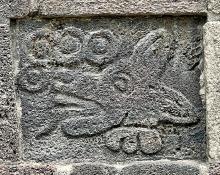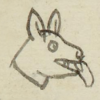itzcuintli (TR8r)
This simplex glyph for dog (itzcuintli) has been extracted from the compound glyph-notation for Chicuei Itzcuintli (Eight Dog, 8-Dog), a date in the calendar. The dog is shown only as a head, in profile, looking to the viewer's right. Its eye is open and its tongue is hanging out of its mouth. Two fangs also protrude. The coat of the dog is an orange color. Its ears have black tips. Its eye has a black ring around it. The dog's neck has a red band around it and, below that is a scalloped yellow fringe. Below the fringe may appear some organs in red and yellow or a blood flow at least in the middle. Organs, as shown below, typically come in red and yellow. Scalloped yellow edges can suggest a severing, such as can be seen in the severed part of the tree of Tamoanchan (also below). The autonomous-era sculpture of the divine force of Coyolxauhqui, who was cut into many pieces, has these scalloped edges all over it. For more on red and yellow interiors, see the article on the left navigation bar.
Stephanie Wood
The suggestion of blood flow from the neck comes from the analysis of a drawing of the female divine force, Tlaltecuhtli, in Joseph Kroger and Patrizia Granziera, Aztec Goddesses and Christian Madonnas (2020), 18. The speculation of possible internal organs come from some Codex Mendoza glyphs for organs (see below).
The izcuintli is a day sign in the calendar, which is the context from which this example has been taken. It is therefore different from the example of a dog glyph (shown below) from the Codex Mendoza.
Stephanie Wood
izcuintli
izcuintli
Stephanie Wood
ca. 1550–1563
Stephanie Wood
dogs, perros, calendarios, calendars, dates, fechas, colmillas, lenguas, ojos redondos
This example of a carved stone hieroglyph representing the date Nahui Itzcuintli (Four Dog, or 4-Dog) has some details in common with the example from the Codex Telleriano-Remensis, above. At the site of its neck there is some scalloping, suggesting decapitation. It also has a protruding tongue. This stone carving is located on the Templo Calendárico at the Tlatelolco archaeological site. Photo by R. Haskett, 2 May 2025.

itzcuin(tli), dog, https://nahuatl.wired-humanities.org/content/itzcuintli
el perro
Stephanie Wood
Telleriano-Remensis Codex, folio 8 recto, MS Mexicain 385, Gallica digital collection, https://gallica.bnf.fr/ark:/12148/btv1b8458267s/f41.item.zoom
The non-commercial reuse of images from the Bibliothèque nationale de France is free as long as the user is in compliance with the legislation in force and provides the citation: “Source gallica.bnf.fr / Bibliothèque nationale de France” or “Source gallica.bnf.fr / BnF.”







